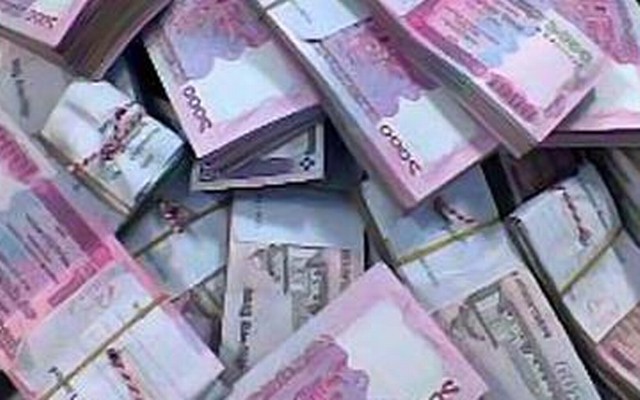The country’s banking sector is in dire straits due to lack of good governance, insiders say.
As many as 13 out of the 48 state-owned, private and specialised banks are plagued with default loans and irregularities in loan disbursement thanks to lax control and monitoring system of the Bangladesh Bank.
Among them, eight are state-owned and specialised banks. The five private banks are Bangladesh Commerce Bank, National Bank, Farmers Bank, NRB and ICB Islamic Bank.
The ICB Islami Bank, for instance, shoulders the burden of the dissolved Oriental Bank’s corruption.
The central bank has not taken any action on the unprecedented incidents centring change of ownership in the private banking sector. On the contrary, it has, in fact, backed these incidents. As a result, panic has gripped the depositors and other stakeholders.
Persons involved in the banking sector said that in full knowledge of the central bank, state-owned BASIC turned into a problematic bank since 2011.
Loan disbursement spiralled out of control, crossing limits and without verifying records. This has become a normal phenomenon in the state-owned banks. This has aggravated the loan defaults. Ultimately the people have to shoulder the burden. The government has to provide capital to these banks from the taxpayers’ money.
There are further new banks in the pipeline for approval. Even before getting approval, the police have advertised for the post of managing director for their new bank.
Former governor of Bangladesh Bank Salehuddin Ahmed said, “A crack has developed in the operations, management and regulation of entire banking sector. It may have a negative impact on the economy. It was a wrong decision to allow so many banks to operate. The condition of new banks is rapidly deteriorating.”
Under pressure of bank owners, the government has initiated a move to bring amendments to the Bank Company Act. The ownership of bank will go to the pocket of several families if the amendment is passed. As per proposed amendments, four members from a single family can remain on a bank board, and they can continue for nine years at a stretch.
In an interview with Prothom Alo in Washington on 15 October, finance minister Abul Maal Abdul Muhith said the banking sector is not running well. Weak monitoring system of the central bank is mainly responsible for it, the minister added.
A meeting on the overall situation of Sonali, Agrani, Janata and Rupali banks was held on 12 September. Managing directors and chief executive officers of these banks attended the meeting presided over by Bangladesh Bank governor Fazle Kabir.
According to the minutes of the meeting, it had been observed that the managing directors of banks placed the loan proposals at the board meetings in violation of the Bank Company Act.
Rules and regulations are not followed in disbursing loans to big loan recipients. Loans are also proferred beyond limit. As a result, these soon become default loans.
About the deteriorating situation of state-owned banks, senior secretary of financial institution division Md Eunusur Rahman told Prothom Alo, “I only want to say that the banks have scope to improve and I have taken some initiatives.”
Some sort of panic is prevailing in the banking sector after the change of ownership and management of Islami Bank in January and Social Islami Bank in October. Chittagong-based S Alam Group has taken over these two banks this year. The financial condition of Islamic Bank has deteriorated. Both income and growth of deposit have fallen. Earlier, S Alam Group took the bought share of Bangladesh Commerce Bank from Bikalpadhara Bangladesh secretary general Abdul Mannan. But the situation of default loans has not changed. About 34 per cent of the total loan is in default.
Speaking to Prothom Alo, former adviser to the caretaker government AB Mirza Md Azizul Islam said the banking sector will never run properly without the political will of the government. The central bank has to be given the power to fully control the state-owned and private banks.
Former chairman of BASIC Bank Sheikh Abdul Hai Bacchu is allegedly involved in the irregularities and corruption of about Tk 40 billion. But Bangladesh Bank, the finance ministry and the Anti-Corruption Commission (ACC) could not take any action against him.
The liquidity crisis of Farmers’ Bank is acute. This bank has to pay a fine of Tk 180 million as it failed to make its due deposits with the central bank. The central bank also has detected irregularities in the NRB Commercial Bank.
Although the chairman of this bank is responsible for irregularities, the central bank has not taken any action against him.
Loan defaults of National Bank stands at Tk 24.43 billion till June last, which is 11 per cent of total loan. The bank is unable to recover the loan and take legal action.
Speaking to Prothom Alo, spokesman and also executive director of Bangladesh Bank Subhankar Saha said, “It is true that it would have been better if the control and monitoring of the central bank was perfect. But the allegation is not true that the central bank is doing nothing. Farmers Bank has been fined, and steps are being taken against those responsible for the deterioration of NRB Commercial Bank.”
Persons involved in the banking sector alleged that the predicament of the banking sector is due to political decisions. The central bank can’t take action although the irregularities. Political will is a must to emerge from this situation.
Source: Prothom Alo

